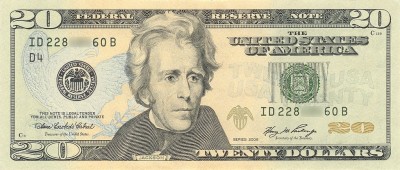Women's Group Urges Removal of Andrew Jackson from the $20 Bill
If one group has its way, Andrew Jackson may soon be disappearing from the $20 bill. Women on $20s is a non-profit campaign to place a woman on the $20 bill. A fitting gesture, they say, because their hope is to have this new $20 bill ready for printing in the year 2020 -- the 100th anniversary of the year women were legally given the right to vote by the ratification of the 19th Amendment.
Women on $20s is specifically taking aim at the seventh president because, as they point out, Andrew Jackson helped Congress pass the "Indian Removal Act of 1830," which pushed Native American tribes off land in the southeastern United States to make room for expansion of white settlement. This event is widely known as the Trail of Tears and resulted in the deaths of thousands of Native Americans due to disease, starvation, and exposure during the mass relocation.
The group's goal is to gain 100,000 signatures on a petition, which will then be sent to President Barack Obama and the U.S. Treasury Department. Women on $20s say they must act now if they want to see a woman appear on the $20 bill in time for the 2020 centennial of the 19th Amendment; it could take three to five years for the necessary logistics of a design change on the $20 bill to occur.
The group also reminds its supporters that Jackson was an ironic choice to appear on the $20 bill (or any paper currency) because he opposed the central banking system and heavily promoted the use of "hard money" (gold and silver) over bank notes.
Many who support keeping Jackson on the $20 bill cite that, as a former president and military hero, he deserves to stay right where he is. Those who support leaving the $20 bill alone also bring to mind other instances when women (aside from figurative representations of Lady Liberty) have already appeared on regularly circulating money, including the Susan B. Anthony dollar and Sacagawea dollar. Martha Washington was the first woman to appear on paper currency, making her debut on the $1 silver certificate in 1886.

